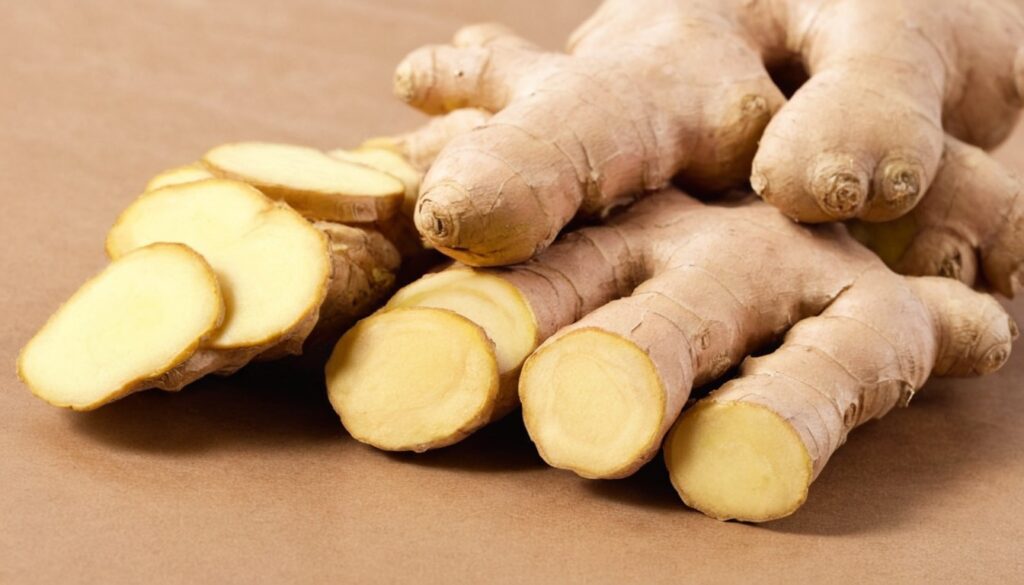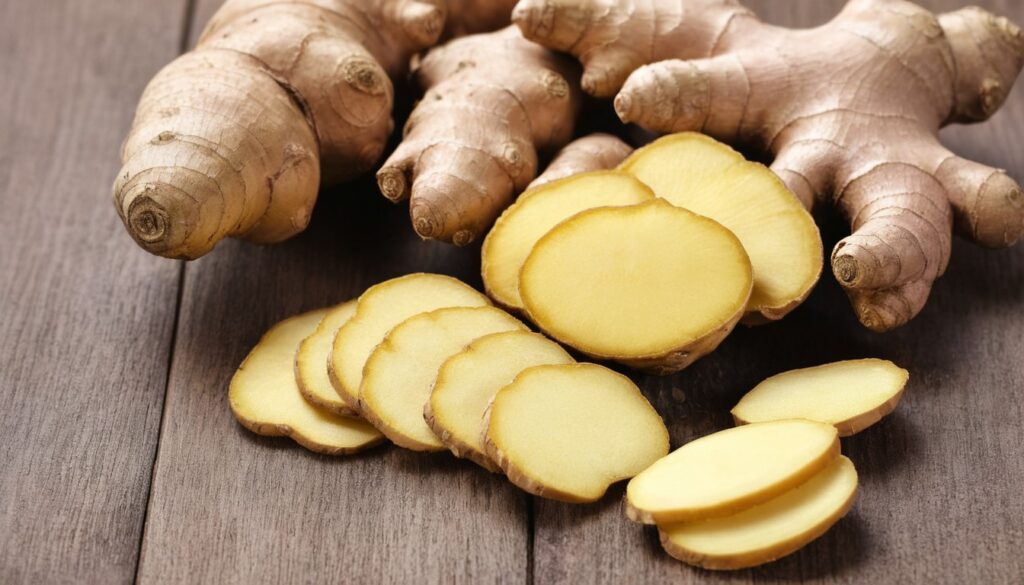Ginger, a knobby root with a rich history, has been a stalwart in traditional medicine for centuries. Originating from Southeast Asia, this spice quickly spread its aromatic influence across the globe, finding its way into various cultural and culinary practices. Its journey as a medicinal powerhouse dates back to ancient times, where it was revered for its versatility in addressing a myriad of health concerns.
Historically, ginger has been a key player in Ayurvedic and traditional Chinese medicine, cherished for its potent anti-inflammatory and antioxidant properties. From soothing digestive discomfort to being a remedy for nausea, ginger has earned its reputation as a natural healer.
In the modern age, as we unearth more of ginger’s secrets, one aspect stands out prominently – its profound impact on respiratory health. While its roots are embedded in historical healing practices, contemporary research has shed light on ginger’s unique ability to benefit the respiratory system.
As we navigate the complex landscape of health and wellness, the focus shifts to holistic solutions. Ginger, with its natural compounds and therapeutic effects, emerges as a promising ally for those seeking respiratory well-being. In this exploration, we aim to unravel the specific ways in which ginger lends a helping hand to our respiratory health, offering a natural alternative in our quest for easier breathing and overall vitality. Join us on this aromatic journey through the centuries, where the roots of tradition meet the science of today.

Dive into the Benefits: How Ginger Acts as an Antihistamine
Ginger’s antihistamine prowess sets the stage for a respiratory revolution. Histamines, the troublemakers behind allergies and respiratory issues, are met head-on by the natural compounds in ginger. As these compounds inhibit histamine release, they work to alleviate symptoms associated with allergies, making ginger a natural and accessible solution.
In the intricate dance of our immune system, ginger emerges as a partner, preventing airway contraction and promoting smoother breathing. The result? Respiratory relief that extends beyond conventional approaches. Ginger, once primarily celebrated for its culinary charms, now takes center stage as a formidable antihistamine agent, combating the very triggers that compromise our respiratory well-being.
As we navigate the maze of respiratory challenges, ginger distinguishes itself with its multifaceted approach. Unlike some conventional treatments that may carry unwanted side effects, ginger steps in as a gentle yet effective solution. Its ability to address not only symptoms but also the underlying causes makes it a standout contender in the realm of respiratory health.
Ginger’s impact on airway issues is profound – it doesn’t merely provide a temporary fix but actively works to improve the overall health of the respiratory system. By inhibiting airway contraction and offering relief from allergy symptoms, ginger proves to be a holistic ally in our pursuit of unencumbered breathing. As we continue our exploration, we’ll uncover the practical applications of ginger in everyday respiratory care, making it an essential addition to our wellness toolkit.
Ginger vs. Allergies: A Natural Ally in the Battle for Easy Breathing
Ginger’s natural prowess extends beyond merely inhibiting histamines; it actively engages in the battle against allergies and common respiratory issues. Whether it’s seasonal allergies, pollen sensitivity, or recurring respiratory discomfort, ginger emerges as a reliable ally.
Research suggests that the active compounds in ginger possess anti-inflammatory properties, providing a shield against the inflammatory response triggered by allergens. This not only reduces the severity of allergic reactions but also contributes to long-term respiratory health. Ginger, in its simplicity and accessibility, becomes a natural alternative for those seeking relief from the persistent challenges posed by allergies.
One of ginger’s distinctive features is its ability to stimulate mucus secretion, a seemingly counterintuitive yet remarkably effective mechanism. In the context of respiratory health, this becomes a game-changer for allergy sufferers.
Increased mucus production serves a dual purpose. Firstly, it helps trap and expel irritants, providing immediate relief from congestion and discomfort. Secondly, by promoting mucus secretion, ginger aids in maintaining a well-lubricated respiratory system, preventing the recurrence of respiratory issues. This natural approach to respiratory care positions ginger as a versatile and accessible solution for those navigating the challenges of allergies and common respiratory ailments.
As we journey further into the benefits of ginger for respiratory health, we’ll uncover practical and delicious ways to incorporate this healing root into our daily routines. Stay with us as we explore ginger’s aromatic path to easier breathing and enhanced well-being.
Discovering the historical roots of ginger as a cold and flu remedy
Ginger’s legacy as a cold and flu remedy echoes through the annals of history, where ancient healers turned to this aromatic root for its potent healing properties. In times when winter’s chill brought sniffles and discomfort, ginger emerged as a trusted companion.
The warming nature of ginger makes it an ideal candidate for combating the common cold. Its anti-inflammatory properties provide relief to inflamed airways, while its natural antiviral and antibacterial qualities contribute to a robust defense against flu viruses. As we embrace the wisdom of traditional medicine, ginger takes its place as a time-tested remedy for winter woes.
Crafting a simple ginger and honey elixir for coughs and sore throats
In the heart of cold and flu season, a simple yet effective ginger and honey elixir becomes a soothing balm for respiratory discomfort. Harnessing the combined benefits of ginger’s anti-inflammatory properties and honey’s throat-soothing qualities, this elixir offers relief from persistent coughs and sore throats.
Recipe: Ginger and Honey Elixir
Ingredients:
- 1 teaspoon of freshly grated ginger
- 1 tablespoon of raw honey
- 1 cup of hot water
Instructions: a. Grate fresh ginger into a cup. b. Pour hot water over the ginger. c. Allow it to steep for 5-7 minutes. d. Stir in raw honey. e. Sip and enjoy the soothing benefits.
This simple yet powerful concoction becomes a staple in the respiratory wellness toolkit, providing comfort and relief during bouts of cold and flu. As we move forward, we’ll explore the wonders of ginger tea and its role in alleviating congestion and promoting overall respiratory health. Stay tuned for more tips on embracing ginger for a breath of fresh air.

Sip Your Way to Clear Airways: Ginger Tea for Congestion Relief
Ginger tea, a delightful elixir that warms the soul and clears the airways, takes center stage in our journey toward optimal respiratory health. Beyond its comforting aroma and taste, ginger tea boasts a range of benefits that make it a go-to solution for congestion relief.
The steam from ginger tea helps to open up nasal passages, providing immediate relief from congestion. Simultaneously, the anti-inflammatory properties of ginger work their magic, reducing inflammation in the respiratory system. Whether enjoyed during a cozy evening or as a morning ritual, ginger tea becomes a daily act of self-care, supporting our respiratory well-being in a deliciously simple way.
Recipe: Ginger Tea for Congestion Relief
Ingredients:
- 1 tablespoon of freshly grated ginger or ginger slices
- 1 to 2 cups of water
- Optional: Lemon slices, honey, or mint for added flavor
Instructions: a. Bring the water to a boil in a pot. b. Add the freshly grated ginger or ginger slices. c. Reduce heat and let it simmer for 10-15 minutes. d. Strain the tea into a cup. e. Add optional lemon slices, honey, or mint for added flavor. f. Sip and enjoy the soothing benefits.
Incorporating ginger tea into your daily routine not only provides relief from congestion but also establishes a calming ritual that contributes to overall respiratory health. As we continue our exploration, we’ll dive into the synergistic benefits of ginger and fenugreek in addressing more complex respiratory issues, including asthma. Join us as we sip our way to clearer airways and enhanced well-being.
Exploring the potent mixture of ginger and fenugreek for asthma
For those navigating the challenges of asthma, the combination of ginger and fenugreek emerges as a dynamic duo, offering natural relief and improved respiratory health. Both ingredients bring unique properties to the table, creating a synergy that addresses the complexities of asthma symptoms.
Ginger’s Role:
- Anti-inflammatory properties that help reduce inflammation in the airways.
- Antioxidant compounds that contribute to overall respiratory well-being.
Fenugreek’s Contribution:
- Mucolytic properties that assist in breaking down mucus, easing congestion.
- Anti-inflammatory effects that complement ginger in mitigating asthma-related inflammation.
Together, ginger and fenugreek present a holistic approach to asthma management, providing relief from symptoms and contributing to long-term respiratory health.
Recipe: Ginger and Fenugreek Asthma Relief Mixture
Ingredients:
- 1 tablespoon of fresh ginger juice (extracted from grated ginger)
- 1 teaspoon of fenugreek seeds
- 1 cup of water
Instructions: a. Grate fresh ginger and extract the juice. b. In a pan, add fenugreek seeds to water and bring it to a boil. c. Once boiling, add the ginger juice to the mixture. d. Simmer for 5-7 minutes. e. Strain the mixture and let it cool. f. Consume this mixture regularly to experience respiratory relief.
This simple yet potent mixture can be incorporated into your routine as a natural aid for asthma. As we move forward, we’ll explore how ginger extends its benefits beyond respiratory issues, aiding in digestive health and providing relief from stomach flu or food poisoning. Join us as we uncover the diverse applications of ginger for a healthier, more vibrant life.

Ginger’s role in tackling stomach flu and food poisoning
Beyond its remarkable impact on respiratory health, ginger steps into the spotlight as a versatile remedy for stomach flu and food poisoning. The same anti-inflammatory and antimicrobial properties that make it effective in respiratory care also lend a helping hand in settling stomach woes.
Ginger’s ability to soothe the digestive system and alleviate nausea makes it a trusted remedy for those grappling with stomach flu or food poisoning. Whether it’s a bout of indigestion or an upset stomach, ginger provides relief by calming inflammation and promoting the expulsion of toxins, contributing to overall well-being.
Ginger Infused Water:
- Add slices of fresh ginger to your water for a refreshing and digestive-boosting drink.
Ginger in Meals:
- Incorporate grated or minced ginger into your cooking, adding a burst of flavor and digestive support to your meals.
Ginger and Lemon Elixir:
- Mix ginger juice with lemon and a touch of honey for a morning elixir that aids digestion and respiratory health.
Ginger Tea After Meals:
- Enjoy a cup of ginger tea post-meals to enhance digestion and promote respiratory well-being.
By seamlessly integrating ginger into your daily routine, you not only address respiratory concerns but also fortify your digestive system. As we wrap up our exploration, we’ll delve into practical ways to incorporate ginger into your daily meals for sustained health benefits. Stay with us as we uncover the culinary delights of this remarkable root.
Ginger in Your Daily Routine: Simple Steps, Big Respiratory Rewards
Morning Boost Smoothie:
- Blend fresh ginger, spinach, banana, and a splash of coconut water for a nutrient-packed smoothie that kickstarts your day with respiratory and digestive benefits.
Ginger-Lemon Dressing:
- Create a zesty dressing with grated ginger, lemon juice, olive oil, and a pinch of salt to drizzle over salads, providing a burst of flavor and respiratory support.
Ginger Infused Soups:
- Enhance your favorite soups with ginger slices or minced ginger, turning a comforting bowl into a respiratory-boosting delight.
Ginger Turmeric Rice:
- Cook rice with turmeric and add minced ginger for a flavorful and healthful side dish, combining the anti-inflammatory properties of ginger and turmeric.
Ginger Snack Bites:
- Prepare energy bites with chopped ginger, nuts, dates, and a hint of honey for a tasty and portable snack that supports respiratory health.
By infusing your meals with the vibrant flavors of ginger, you not only elevate the culinary experience but also promote sustained respiratory wellness.

Understanding potential side effects and interactions
While ginger stands as a natural marvel for respiratory and digestive health, it’s essential to approach its consumption with mindfulness. Though generally safe for most individuals, there are considerations to bear in mind:
Moderation is Key:
- Excessive consumption of ginger may lead to digestive discomfort. Start with small amounts and gradually increase based on your body’s response.
Blood-Thinning Properties:
- Ginger has mild blood-thinning effects. If you’re on blood-thinning medications, consult your healthcare provider to ensure a balanced approach.
Pregnancy and Medical Conditions:
- Pregnant individuals or those with underlying medical conditions should seek professional advice before incorporating large amounts of ginger into their routine.
Potential Interactions:
- Ginger may interact with certain medications. If you are taking medications, especially for heart conditions or diabetes, consult your healthcare provider to prevent any potential interactions.
B. Why consulting with a healthcare professional is crucial
Before embarking on a significant shift in your dietary or wellness routine, it’s advisable to consult with a healthcare professional. They can provide personalized guidance based on your health status, ensuring that the incorporation of ginger aligns with your specific needs and any existing medical considerations.
Ginger, when used judiciously, offers a plethora of health benefits, contributing to improved respiratory and digestive well-being. Our journey through the aromatic world of ginger has been a flavorful exploration of its potential. Let’s recap our findings and conclude with an invitation to embrace the natural path to enhanced health with ginger as a steadfast companion.
Conclusion
In our aromatic journey through the annals of traditional medicine and modern research, we’ve uncovered the multifaceted wonders of ginger. From its historical roots as a revered remedy in Ayurveda and traditional Chinese medicine to its current status as a natural ally in respiratory health, ginger has proven itself as a powerhouse of healing.
Recapping our findings, ginger:
- Acts as a natural antihistamine, inhibiting airway contraction and alleviating allergy symptoms.
- Provides relief from colds and flu through its anti-inflammatory and antiviral properties.
- Offers a comforting elixir for persistent coughs and sore throats with the combination of ginger and honey.
- Clears airways and reduces congestion through the soothing magic of ginger tea.
- Collaborates with fenugreek for a potent mixture that aids in asthma management.
- Extends its benefits to digestive health, settling stomach flu, and food poisoning discomfort.
As we conclude our exploration, the aromatic journey with ginger invites you to consider the holistic benefits of this humble root. From the kitchen to traditional medicine, ginger bridges the gap between the ancient wisdom of healing and modern scientific validation.
Embrace ginger as not just a spice in your kitchen but as a companion on your journey to better respiratory health. Whether sipping on ginger tea, preparing a ginger-infused meal, or crafting a natural remedy for respiratory issues, let ginger be a flavorful and fragrant part of your everyday life.
In the pursuit of well-being, let nature’s remedies be your guide. Ginger, with its rich history and proven benefits, stands ready to elevate your respiratory health naturally. Cheers to the aromatic, holistic journey towards a life where each breath is a testament to vitality and balance.

Meet Author
I am a Health/Wellness and Nutrition Blogger. Bringing you well-researched details on your nutrition and health information. I love Helping you enjoy good health with the right choice of food.
Disclaimer
The information provided on this page is intended for general informational purposes only and was gathered by research on general nutrition science and experiments. The content is not intended to be a substitute for your specific professional medical, nutritional, or fitness advice, diagnosis, or treatment.
Recent Posts
- 7 Surprising Reasons Why You Need a Balanced Diet Every Day as a Woman
- The Mediterranean Diet and Dementia: Protecting Brain Health
- Superfoods for Brain Health: Diet To Fight Dementia
- Nutritional Strategies for Managing Dementia Symptoms
- How To Recognize Early Signs and Symptoms of Dementia
- Managing Lewy Body Dementia: Understanding Symptoms and Nutrition
- Understanding Vascular Dementia: Causes, Symptoms, and Dietary Solutions
- Alzheimer’s Disease and The Right Diet: All You Need To Know
- Dementia vs. Normal Aging: Debunking Myths and Clarifying Realities
- What are The Risk Factors for Dementia?
- Dementia And Omega 3 Fatty Acid ( Eicosapentaenoic acid )
- The Role of Nutrition in Dementia Prevention
- Dementia: An Introduction to the Condition and Management
- Okra Extract Supplements: A Nutrient-Rich Addition to Your Wellness Routine
- Okra and Eye Health: Okra and Vitamin A for Clear Vision
- Fuel Your Fitness: Okra’s Role in Sustaining Energy and Enhancing Muscle Recovery
- Age Gracefully with Okra: Supporting Joint Health in the Elderly
- Slim Down with Okra: Low-Calorie Smoothie Recipes
- Why Okra is a Must-Have for Pregnant Mom: The Folate Advantage
- DIY Beauty: Okra-Based Face Masks for Radiant Skin
- Boosting Milk Supply: The Okra Advantage for Nursing Moms
- Boost Your Child’s Growth with Okra: A Nutrient-Packed Superfood
- How Okra Supports Cycle Regularity: The Menstrual Miracle
- Boosting Testosterone Naturally: The Role of Okra in Men’s Health
- Detox Delight: How Okra Supports Your Body’s Natural Cleansing Process
- How Okra Fights Cancer: Okra and Cancer Prevention
- Explore 10 Health Benefits Of Garlic: A Comprehensive Guide
- Health Benefits of Garlic for Fighting Cough and Cold Infections
- Can Garlic Be Used As a Natural Antibiotic?
- How Effective is Garlic in Lowering Cholesterol And Improving Heart Health?
- Garlic’s Brain Boost: Protecting Against Alzheimer’s and Dementia
- Garlic: Your Gut’s Best Friend – Enhance Digestion Naturally
- Unveiling the Immune-Boosting Powers of Garlic
- Using Garlic to Lighten Acne Scars Naturally: Skin Nutrition
- Beating Ulcers Naturally: The Garlic Solution
- Adding Garlic to Your Athletic Nutrition Routine.
- Garlic vs. UTI: Natural Remedy for Urinary Tract Infections
- How to Combat Exercise Fatigue with Garlic: The Science Behind it
- The Power of Garlic: Safely Reducing Blood Toxicity
- Garlic: A Natural Solution for Oestrogen Deficiency
- Garlic’s Role in Osteoarthritis Management: A Natural Remedy for Joint Health
- Platelet Power: Garlic’s Role in Preventing Heart Blockages
- Harnessing Garlic’s Power: 5 Health Benefits You Need to Know
- Unlocking the Secrets of Garlic in Preventing Thromboembolism
- Unlocking Garlic’s Potential: A Natural Approach to Lowering Blood Pressure
- Boosting Men’s Wellness: The Power of Garlic
- Explore The Incredible Benefits of Garlic for Women’s Health
- Treating Throat Disorders Naturally with Papaya
- Can Papaya Be Used Treatment For Ringworm?
- Can Cucumber Reduce the Risk of Cancer?
- Using Cucumber to Reduce Puffiness Around The Eyes.
- Using Cucumber For a Better Skin: Beauty Benefits of Cucumber.
- Are Cucumbers Helpful in Weight Loss?
- Can Cucumber Help Reduce Blood Sugar and Manage Diabetes?
- How can I improve my digestion with Cucumber?
- Unveiling Cucumbers’ Secrets for Hair and Nails: From Salad Bowl to Beauty Regimen
- Can Papaya Help Treat Piles? Hemorrhoids Natural Relief.
- Refreshing Solutions: Cucumbers for Bad Breath.
- Can Cucumber Help Regulate Blood Pressure?
- Cucumber: A Good Choice for Hydration and Detoxification
- How Papaya Can Help Reduce Lung Inflammation: Insights and Practical Tips
- Seniors’ Secret Weapon: Harnessing Cinnamon’s Health Benefits
- Transform Your Routine: Cinnamon for Beauty
- Discovering the Benefits of Cinnamon for Oral Hygiene
- Boost Your Workout: How Cinnamon Fuels Athletes.
- Unlocking the Weight Loss Potential of Cinnamon: A Comprehensive Guide
- Let’s Discuss Cinnamon Consumption During Pregnancy.
- Spicing Up Motherhood: Cinnamon Benefits for Nursing Moms
- Spice Up Your Child’s Diet: Fun Ways to Include Cinnamon in Meals
- Cinnamon: A Natural Remedy for Women’s Menstrual Health
- Using Cinnamon as a Natural Aphrodisiac: The Role of Cinnamon in the Infertility treatment and Sexual drive.
- Can Cinnamon Be Used in Treating Erectile Dysfunction?
- Can Eating Papaya Help Prevent Arthritis?
- Does papaya have Anticancer Effects?
- Can papaya Aids Digestion?
- Can Papaya Seeds Help Heal Wounds?
- How To Use Okra To Lose Weight and Reduce Belly Fat.
- How To Use Okra to Improve Capillaries Function.
- Can Okra Help Maintain a Healthy Heart and Prevent Heart Disease?
- Can Okra Help Prevent Constipation?
- How Can Okra Help Get Rid of Cholesterol?
- Can Okra Help Stabilize Blood Sugar and Prevent Diabetes?
- The Beauty Benefits of Okra for Hair, Skin, and Nails.
- How Okra Can Boost Women’s Health and Wellness.
- How Okra Can Boost Men’s Health: Unlocking the Nutritional Power of this Versatile Vegetable
- Different Ways to Include Okra to Your Diet
- Okra: Your Delicious Pathway to Vibrant Health and Culinary Delight!
- How Does Eating Papaya Boost Immunity?
- Preventing Macular Degeneration with Papaya. : Maintaining A Healthy Eye Vision
- Can Papaya Promotes Cardiovascular Health?
- How To Use Papaya To Condition Your Hair.
- Can Papaya Help in Controlling Dandruff?
- Can Papaya Stimulates Hair Growth?
- The Cognitive Benefits of Cloves for Brain Health.
- Can Cloves Alleviate Menstrual Discomfort and Regulate Menstrual Cycles?
- How To Use Papaya To Reduce Under-Eye Dark Circles.
- Can Papaya Help Reduce Skin Wrinkles?
- Can Papaya Help Clears Skin Pigmentation?
- Can Papaya Help Moisturize Dry Skin?
- Can Papaya Help Treat Eczema And Psoriasis?







